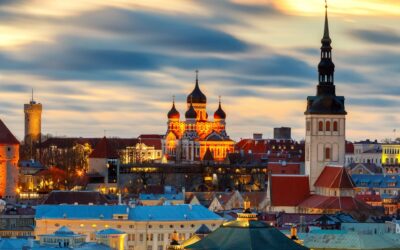Estonia is rapidly becoming a popular destination for foreign professionals eager to work in a digitally advanced and efficient European country. Whether you are planning to join a growing tech company, a startup, or another business sector, the first and most crucial step for many non-EU citizens is obtaining a working visa in Estonia. For those planning to stay longer than three months, the long-stay D visa in Estonia is often the most suitable option.
At BBCTallinn, we assist professionals and businesses with navigating Estonia’s immigration system. Our team has extensive experience in preparing visa applications, providing document support, and helping applicants settle in once they arrive. In this article, we will guide you through everything you need to know about the working visa D in Estonia, including what it is, who it is for, the application process, and how BBCTallinn can support you every step of the way.
What Is the D Visa in Estonia and Who Needs It
The D visa in Estonia is a long-stay visa that allows non-EU citizens to remain in the country for more than ninety days within a period of one year. The visa can be granted for up to 365 days, and it is commonly issued for purposes such as employment, business, study, or research. In the context of work, the D visa is ideal for those who have received a job offer from an Estonian company and need to start working before they receive a residence permit.
This visa is particularly useful for workers who want to begin employment immediately, rather than waiting for the longer residence permit process. It is also a practical option for individuals involved in short or medium-term work projects that do not require a multi-year stay in the country.
If you are a third-country national and have secured a job in Estonia, you will likely need to apply for a D visa before entering the country unless you already hold a different legal basis to stay. The visa ensures you can reside and work in Estonia legally while complying with national immigration laws.
Key Differences Between the D Visa and a Residence Permit
While both the D visa and a temporary residence permit allow foreign nationals to stay in Estonia for extended periods, there are important differences between the two.
The D visa is quicker to obtain. Processing times are generally shorter, and in many cases, applicants can receive a decision within just a few weeks. This makes it ideal for situations where work must begin soon. However, the D visa is limited in duration, with a maximum validity of one year, and it does not provide as many long-term benefits as a residence permit.
A temporary residence permit, on the other hand, is intended for longer stays and usually grants broader rights, including family reunification, access to additional social services, and easier renewal options. Applying for a residence permit typically takes more time and involves a more complex process, but it is the preferred route for those planning to build a long-term life in Estonia.
In many cases, individuals use the D visa as a stepping stone, arriving in Estonia with this visa while their residence permit application is being processed. This allows them to begin working and integrating into Estonian society without unnecessary delays.
Requirements for the Working Visa D in Estonia
Applying for a working visa in Estonia involves several basic requirements that applicants must meet. First, you must have a valid job offer from a registered employer in Estonia. The employment contract must comply with local labour laws and clearly state the terms of employment, including position, salary, working hours, and duration.
In addition to the employment offer, applicants must provide a valid passport, typically with at least two blank pages and valid for at least three months beyond the planned stay. A recent passport-size photo is also required, along with a completed application form for the long-stay visa.
Another essential requirement is health insurance. Applicants must hold a valid insurance policy that covers the entire duration of their stay in Estonia. This insurance must be recognised within the European Union and provide sufficient coverage for medical expenses and emergencies.
Financial means are also assessed. The applicant must demonstrate that their income meets the legal minimum threshold set by Estonian authorities, which varies depending on the sector and job role. For many professions, the required monthly salary must at least meet the Estonian minimum wage. However, some specialised positions may be subject to higher salary requirements.
A clean criminal record is also expected. Estonian authorities require applicants to confirm they do not have any serious criminal convictions. Although a formal police certificate may not always be required, applicants must be truthful about their legal background.
Depending on your nationality or employment sector, additional documentation may be needed. For example, if you are applying as a skilled worker in IT or engineering, you may be asked to submit educational diplomas or evidence of relevant professional qualifications.
Application Process for the D Visa in Estonia
Once you have prepared the required documents, the next step is to submit your application. This can typically be done at an Estonian embassy or consulate in your country of residence. If you are already legally in Estonia on another basis, such as a short-stay visa, you may be allowed to apply through the Estonian Police and Border Guard Board.
The application must be submitted in person. During your appointment, you will need to present your documents, provide biometric data, and possibly answer questions regarding your work plans and travel intentions. The visa fee must also be paid at the time of application. As of the current regulations, the standard fee for a long-stay D visa is around one hundred euros, though this can vary slightly depending on the embassy.
Processing times can vary but usually range from fifteen to thirty calendar days. Some embassies offer an expedited option for urgent applications, although this is not guaranteed and may incur additional costs. To avoid delays, it is crucial to ensure that all documents are correct, complete, and translated if necessary.
Applicants should also be aware that even minor errors can result in delays or a refusal. This is where expert guidance becomes especially valuable. At BBCTallinn, we work closely with clients to ensure all aspects of the application meet Estonian requirements. From reviewing your employment contract to preparing supporting documents and managing communication with the authorities, we provide a full support service to make the process as smooth and stress-free as possible.
How BBCTallinn Can Help
Navigating immigration procedures in a new country can be challenging, particularly when rules differ from one jurisdiction to another. At BBCTallinn, we specialise in helping individuals and companies manage all aspects of the visa process. Our team stays up to date with changes in Estonian immigration law and has first-hand experience handling applications across various sectors and nationalities.
We start by assessing your specific situation and advising on the best approach for your visa application. We help you collect and prepare your documents, ensure compliance with all requirements, and manage communication with embassies or migration authorities. Whether you are applying from abroad or already in Estonia, we will guide you from the first step to the final decision.
If you are an employer looking to hire international talent, we also offer support to ensure your company meets all legal obligations when employing foreign workers.
Life in Estonia After Receiving Your D Visa
Once your D visa has been approved, you can begin preparing for your move to Estonia. The visa allows you to legally enter and reside in the country for up to 365 days. Upon arrival, one of the first steps is to register your place of residence with the local municipality. This registration is mandatory and must be completed within the first month of your arrival.
Alongside registering your residence, you will also need to apply for an Estonian personal identification code, also known as an ID code. This code is essential for everyday tasks such as opening a bank account, signing rental agreements, visiting a doctor, or accessing digital services. In most cases, your employer will assist you in obtaining this code, or you can apply for it through a local government office.
Settling in Estonia is generally straightforward, especially for those coming to work in the larger cities like Tallinn or Tartu. These cities offer a wide range of housing options, international communities, and support services in English. Estonians are typically welcoming to international professionals, particularly those contributing to the country’s growing economy.
With a D visa in Estonia, you can begin working immediately under the terms outlined in your employment contract. If your stay becomes more permanent, you may wish to apply for a temporary residence permit while your D visa is still valid. Doing this from within Estonia is entirely possible and often encouraged, as it allows you to continue working without interruption.
Changing Employers or Extending Your Stay
The D visa in Estonia is issued in connection with a specific job. This means that if you decide to change employers during the validity of your visa, you will need to notify the authorities and possibly reapply with a new employment contract. The process for changing employers depends on the timing and the conditions of your current visa, so it is advisable to consult with a migration advisor or legal expert before making any changes.
If your current visa is nearing expiration and you wish to continue working in Estonia, you should begin the process of applying for a residence permit well in advance. The residence permit provides more flexibility and allows for longer-term integration, including the ability to bring family members and switch jobs more easily.
It is important to monitor the dates on your visa and ensure that you maintain legal residence throughout your stay. Overstaying a visa, even unintentionally, can lead to fines, future entry bans, or complications when applying for future permits.
Can You Bring Family Members with a D Visa?
The D visa is primarily a single-entry work visa intended for the applicant only. It does not automatically grant the right for family reunification. However, in some cases, family members may be able to apply for their own visas based on other grounds, such as accompanying a working spouse.
For longer stays, it is more common to bring family members under a temporary residence permit, which includes provisions for spouse and child reunification. If you are planning to relocate to Estonia with your family, it is important to prepare carefully and explore the best visa route to suit everyone’s needs.
BBCTallinn offers personalised advice in such cases. We can assess your family situation and advise on how to align applications to maximise the chance of success and reduce delays.
Common Questions About the Working Visa in Estonia
One of the most common concerns among applicants is how long the D visa process takes. While processing times can vary, most applicants receive a response within three to four weeks. It is recommended to start preparing your application at least two months before your intended travel date to allow for any unexpected delays.
Another frequent question is whether you can travel within the Schengen Area on a D visa issued by Estonia. The answer is yes, but with limitations. While the D visa is issued by Estonia, it generally allows you to travel within other Schengen countries for up to ninety days in any 180-day period, as long as Estonia remains your main place of residence and employment.
Applicants also often ask whether the D visa can be extended. In general, the D visa cannot be extended beyond 365 days. If you plan to remain in Estonia for a longer period, the appropriate course of action is to apply for a temporary residence permit. This application can be made while you are in Estonia on a D visa.
Lastly, people are often unsure about what happens if their employment ends before the visa expires. Since the visa is tied to the specific employment contract, the end of that contract may affect the validity of the visa. In such cases, it is essential to inform the authorities and seek advice on your options, whether that means finding a new job and reapplying or leaving the country before the visa expires.
BBCTallinn’s End-to-End Support
Applying for a working visa in Estonia can feel overwhelming, especially if you are doing it for the first time or dealing with international paperwork. BBCTallinn is here to simplify the entire process. Our team offers a full suite of services for individuals and employers, from visa preparation and document review to legal advice and post-arrival support.
We understand how important every detail is, and our clients benefit from our direct experience with Estonian authorities and procedures. Whether you need help reviewing an employment contract, collecting the right documents, or communicating with migration officials, we are available to assist you.
For those already in Estonia, we provide ongoing support to ensure that your transition goes smoothly. This includes help with registering your address, obtaining your ID code, and even connecting you with housing and banking options. For companies, we also assist with compliance checks, employee onboarding, and workforce management related to international hiring.
Our goal is not just to help you secure a visa, but to make your entire relocation experience easier and more efficient. With BBCTallinn, you can focus on your new job and life in Estonia, knowing that the legal and administrative side is being handled by professionals.
Conclusion
The working visa D in Estonia is a practical and accessible option for many non-EU citizens looking to start their professional journey in this innovative and welcoming country. Whether you are coming for a short-term project or as a stepping stone to longer-term residence, the D visa provides a legal and efficient way to live and work in Estonia.
While the process may seem complex at first, with the right support and preparation, it can be completed smoothly and confidently. BBCTallinn is proud to support international professionals and businesses in making Estonia their next destination. If you are ready to begin your application or have questions about your specific situation, contact BBCTallinn today. Our team is ready to guide you every step of the way.


